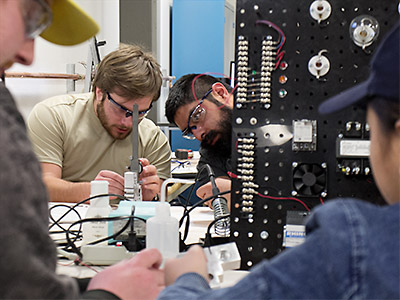
Students participate in a structured lab during Spring Semester. The class covers industry-standard precise measuring tools.
Close to 145 students will now have scholarship funding available to them in the innovative training program developed by Truckee Meadows Community College in partnership with Panasonic Corporation.
The program is called the Panasonic Preferred Pathway, or P3. The Pathway is an employment credential, teaching the culture, safety practices, terminology, and skills needed in advanced manufacturing, robotics and as an entry-level electrical technician.
“The P3 project is an innovative process that allows industries the opportunity to choose the necessary manufacturing-related competencies that can be taught and assessed by community college faculty (who are experts in the field)," said TMCC President Karin Hilgersom, PhD "TMCC can replicate the process for workforce certificates and degrees in other fields as well, and in this way, we continue a tradition of being as responsive as possible to industry training needs.”
More than 100 students have already begun the training modules which are open-entry, a “start any time” model. Modules typically have a text portion, quiz and then a hands-on lab, all of which are completed by students at their own pace during open lab hours at TMCC’s William N. Pennington Applied Technology Center.
There is capacity in the program for 200 students, and because of a new grant approved by the Board of the Governor’s Office of Economic Development (GOED), many will have almost full scholarships to complete the program.
A $175K Grant for Scholarships
On Jan. 19, the Board of the GOED approved grant funding of $175,000 for students enrolled in the P3 training program at TMCC. The funds are provided by the state’s Workforce Innovations for the New Nevada (WINN) program. WINN is appropriated state funding set up by Nevada’s legislators in 2015 to develop workforce training projects and courses.
Workforce development—filling the staffing needs of tech companies moving to the region—is a priority for Nevada Governor Brian Sandoval.
“It is critical that Nevada’s workforce training programs be responsive to employers’ needs, and that is just what the WINN program was designed to do,” said Governor Sandoval in a press release issued by the GOED.
Upon completion of the P3 accelerated training program, students will be prepared for the skills desired by Panasonic. Regional employees of Panasonic work at the Gigafactory located in the Tahoe Reno Industrial Center (TRIC), Sparks, Nev.
“We’re pleased that the GOED is strengthening workforce preparation programs in emerging industries by supporting students,” said J. Kyle Dalpe, Interim Dean of Technical Sciences. “Overall, it helps get people into the pipeline and benefits the economy regionally and statewide.”
Hamilton Company, located across the street from the William N. Pennington Applied Technology Center, has also expressed a need for employees trained in advanced manufacturing and robotics, and will give preference to job candidates who have completed the training program, Dalpe added.
Material Handler and Production Operator
There are two parts in the P3 program: Material Handler (M1) and Production Operator (M2).
M1 is a four-credit introduction of safety, material handling equipment, warehouse concepts, Total Quality Management and precision measurements.
The Production Operator (M2) continues the program with six additional credits in electrical theory, electromechanical and solid-state devices, and industrial safety. Coursework also covers LEAN Manufacturing and process control, a discipline that addresses keeping factors such as temperature and output within a desired range.
Those who complete the program receive an employer-recognized Certificate of Completion.
Students may choose to continue advancing to the Certificate of Achievement, Production Technician program by applying their credits toward the new goal. They may then decide to go even further and work toward the Associate of Applied Science Degree in Manufacturing Technologies with Production Systems Emphasis.
Scholarships Will Cover Most of the Program Costs
The estimated cost for the M1 program is $450, and for M2 it is $700. Part of the cost is the $20 TMCC application fee.
There are no textbooks to buy. Lab binders and materials are provided to students at no additional charge.
The WINN funding will be distributed in partnership with Nevada Department of Employment, Training and Rehabilitation (DETR) through Nevada JobConnect offices.
Scholarships will cover in-state tuition and fees, excluding any additional out-of-state tuition charges. Veterans will be given preference if all other factors between applicants are equal.
“The scholarships are not income-contingent—you can train while you’re working, change direction in your career from food service or other areas,” said Barbara Walden, Director of Technical Sciences. “Or, you can upskill within your present position if you’re already working in advanced manufacturing.”
Because students don’t have to take time off to train, it is a way to gain skills on one’s own preferred schedule and pace.
“This is a great way to go on a career path to higher wages,” she added.
To apply for the WINN-funded scholarships, students are advised to send an email to DETR. Include your full name, phone number, email address and attach a recent resume. Please use “P3 Training” in the subject line.
For more information about TMCC's Panasonic Preferred Pathway (P3) Program, please contact TMCC’s Technical Sciences Division at 775-856-5300.






